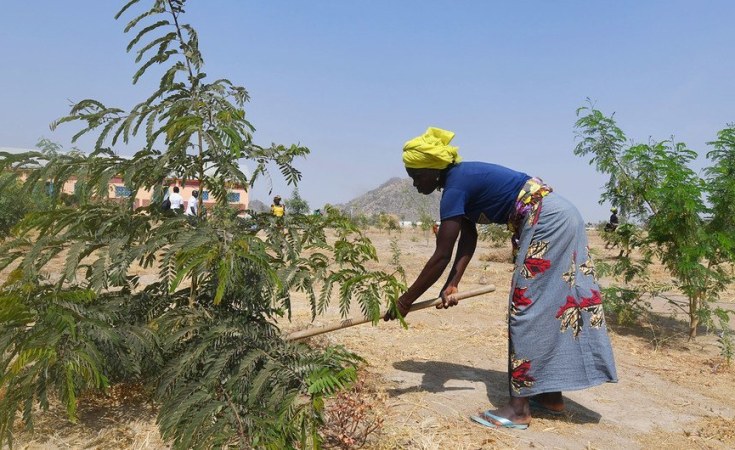Yaounde, Cameroon — Officials in northern Cameroon say conflicts over food, water and other resources have greatly declined due to the planting of about half-a-million trees in and around a refugee camp. U.N. officials and rights groups visited the area to collect success stories on reforestation projects that also reduce climate shocks to share during the upcoming COP 28 climate conference.
Residents and officials in northern Cameroon, near the borders with Nigeria and Chad, say clashes between refugees, displaced people and host communities over food and water have declined in the past year, mainly due to the new forest growing in their midst.
The area is home to about 120,000 refugees from Nigeria, along with a number of internally displaced Cameroonians and returnees whose lives were uprooted by terrorist group Boko Haram.
Ten years ago, UNHCR set up the Minawao refugee camp on about 630 hectares of land near the borders to house 15,000 refugees. But unending violence swelled the camp's population to 72,000, exerting pressure on natural resources.
A 26-year-old mother of two, Liatou Habila fled Nigeria and came to the camp to escape Boko Haram violence in 2016. She says conflicts between local residents, refugees and displaced persons over resources like food and firewood happened almost on a daily basis.
Habila says she is very happy now because she can cut tree branches and use them for cooking unlike in the past when it was very difficult to find wood at the Minawao refugee camp. She says besides cutting down a few tree branches to use as fuel wood, the refugee agency UNHCR has taught them how to make nurseries to plant more trees and make briquettes or compressed blocks of coal dust that help them in cooking.
Cameroon's northern border with Chad and Nigeria is one of the most ecologically fragile areas in central Africa. The Cameroon government says climate change, population growth and rampant exploitation of wood and non-timber plant resources threatens ecological biodiversity and has plunged civilians into deep poverty.
The United Nations reports that in 2016 five Nigerian refugee leaders got together and decided to plant trees in the Minawao camp to alleviate the situation.
Trees planted included cassia, neem, acacia, moringa, cashew and leucaena, which are all drought-resistant and have branches that can be pruned and used for fuel. Some of their leaves are also used for medicine, food or fertilizer.
The UNHCR reports that close to half-a-million trees have been planted in and around the Minawao camp. Refugees and host populations say the trees make it possible for them to create gardens in shade, feed and care for animals and reduce conflicts related to sharing resources.
Women say they are no longer exposed to sexual abuse and violence while trekking long distances to fetch firewood and carry water.
UNHCR Goodwill Ambassador and environmental activist Emtithal Mahmoud visited northern Cameroon this month. She says she listened to refugees' success stories and experiences about the impact of the reforestation project in their daily lives.
"The stories that we are seeing in Cameroon are not just stories of crisis but they are also stories of triumph, stories of resilience, stories of resourcefulness that people are doing to not only survive but thrive in the face of adversity, in the face of our changing climate," said Mahmoud. "I do believe that the solutions created by refugees, led by refugees seeing this work in Minawao, tells me it can work in Darfur, Nepal, and it can work in Bangladesh because there are similar contexts."
Speaking to Cameroon state broadcaster CRV, Mahmoud, who is also a former refugee, said she documented what she called powerful messages and insights to bring to the attention of the world during COP 28. She said addressing climate change and supporting initiatives like the refugee reforestation project in Cameroon should be a priority on all development agendas.


